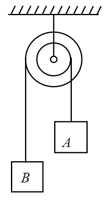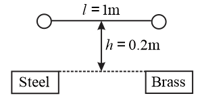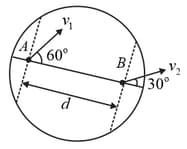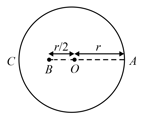B M Sharma Solutions for Chapter: Rigid Body Dynamics I, Exercise 1: DPP 2.1
B M Sharma Physics Solutions for Exercise - B M Sharma Solutions for Chapter: Rigid Body Dynamics I, Exercise 1: DPP 2.1
Attempt the free practice questions on Chapter 2: Rigid Body Dynamics I, Exercise 1: DPP 2.1 with hints and solutions to strengthen your understanding. Chapterwise/Topicwise Daily Practice Problems (DPP) Mechanics - II JEE Main & Advanced solutions are prepared by Experienced Embibe Experts.
Questions from B M Sharma Solutions for Chapter: Rigid Body Dynamics I, Exercise 1: DPP 2.1 with Hints & Solutions
A radius drum carrying the load is rigidly attached to a radius pulley carrying the load as shown. At the time , the load moves with a velocity of (downward) and a constant acceleration of (downward). Over the time interval, , determine:
(i) the number of revolutions executed by the pulley.
(ii) the displacement of the load .

Two points of a rod move with velocities and , perpendicular to the rod and in the same direction, separated by a distance . Then, the angular velocity of the rod is
Two steel balls of equal diameter are connected by a rigid bar of negligible weight, as shown, and are dropped in the horizontal position from height above the heavy steel and brass base plates. If the coefficient of restitution between the ball and steel base is and that between the other ball and the brass base is , the angular velocity of the bar immediately after rebound is,
(Assume the two impacts are simultaneous and take )

Two points and on a disc have velocities and , at some moment. Their directions make angles and , respectively with the line of separation, as shown in the figure. The angular velocity of disc is:

When a person throws a meter stick, it is found that the centre of the stick is moving with a speed of and left end of stick, with a speed of . Both points move vertically upwards at that moment. Then angular speed of the stick is
A ring of radius rolls without slipping on a rough horizontal surface with a constant velocity. The radius of curvature of the path followed by any particle of the ring at the highest point of its path will be:

A rigid body is in pure rotation, that is, undergoing fixed axis rotation. Then, which of the following statement(s) are true.
A particle is revolving in a circle of radius , having centre at , with uniform angular velocity
Choose the correct option(s):

